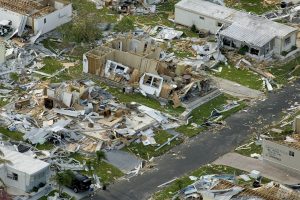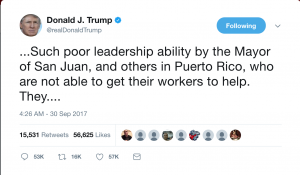In lieu of Monday’s controversial Columbus Day which celebrates Christopher Columbus’ “discovery” of the land known as the United States in 1492, one area conquered via Columbus goes unrecognized in Puerto Rico only until recent events.
Puerto Rico has been regarded as a territory of the United States ever since 1898 when the United States gained control following the Spanish-American war. It has been the subject of much political discussion, particularly following a 70 billion dollar debt and the United States toying with the idea of a bailout back in April. However, it has been brought right back to the forefront after recent devastation of Hurricane

84% of Puerto Rico is left without power after recent devastation from Hurricane Maria.
Maria, a vicious storm claiming more than 80% of the island’s power since the Category 4 storm took plight Sept. 20. The storm has already claimed the lives of 45, with many more still missing.
The current Trump administration’s initial response to the crisis was rather benign in nature, sending government officials and offering discontent towards the idea of funding. Following public pressure and a 353-69 congress vote, a 36.5 billion dollar aid package was agreed upon in Congress.
Trump’s historical moral deficiency and mantra of putting “America First” is further represented in Irum Rafiq’s blog, which describes his efforts towards repealing DACA, a program put in place to allow a pathway to citizenship for children of undocumented immigrants. As described in the blog, in conjunction with the cruelty of deporting children back to a country they have never known or stepped foot on, the economic impact of Trump’s policies can be of concern.
Trump further commented on Puerto Rico in a slew of tweets attacking the mayor of San Juan, describing “poor leadership” and her “not being able to get their workers to help.”

Recent tweet sparking outrage among mayor Carmen Yulin Cruz and many other Puerto Ricans.
Trump visited Puerto Rico October 3rd, offering aid and input on the situation. “You’ve thrown our budget a little out of whack. We’ve spent a lot of money on Puerto Rico; sometimes you get hit, and you really got hit.”
Economic repercussions of the Puerto Rico crisis are significant; with the New York Times predicting over the next fifteen years lowered incomes of up to 21 percent and approximately 180 billion lost in economic output. The crisis is said to take almost 26 years to return back to current levels.
The notion of “America First” is relevant to Puerto Rico, as the citizens of the Caribbean territory are registered as Americans, and served in the U.S forces in every major war. Local autonomy hasn’t historically worked well for Puerto Rico as evidence by fiscal mismanagement and the economic calamity of Hurricane Maria. The next steps for Puerto Rico will be in the creation of a state, which will allow the right to vote and legitimate congressional support.
Word Count: 450
https://www.washingtonpost.com/news/politics/wp/2017/10/12/well-probably-never-know-exactly-how-many-people-died-in-the-aftermath-of-hurricane-maria/?utm_term=.8c253f9342e5
http://www.chicagotribune.com/news/nationworld/politics/ct-trump-puerto-rico-aid-20171012-story.html
https://www.tripsavvy.com/puerto-rico-and-united-states-relationship-1622032
http://www.washingtontimes.com/news/2017/apr/18/puerto-rico-post-bailout-economy-must-stick-to-con/
Images obtained from free photo sharing site, pixabay.com
